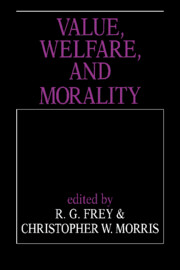Book contents
- Frontmatter
- Contents
- List of contributors
- Preface
- 1 Value, welfare, and morality
- 2 The land of lost content
- 3 Putting rationality in its place
- 4 Can a Humean be moderate?
- 5 Welfare, preference, and rationality
- 6 Preference
- 7 Reason and needs
- 8 Desired desires
- 9 On the winding road from good to right
- 10 Value, reasons, and the sense of justice
- 11 Agent-relativity of value, deontic restraints, and self-ownership
- 12 Agent-relativity – the very idea
- 13 The separateness of persons, distributive norms, and moral theory
- 14 Harmful goods, harmless bads
13 - The separateness of persons, distributive norms, and moral theory
Published online by Cambridge University Press: 07 December 2009
- Frontmatter
- Contents
- List of contributors
- Preface
- 1 Value, welfare, and morality
- 2 The land of lost content
- 3 Putting rationality in its place
- 4 Can a Humean be moderate?
- 5 Welfare, preference, and rationality
- 6 Preference
- 7 Reason and needs
- 8 Desired desires
- 9 On the winding road from good to right
- 10 Value, reasons, and the sense of justice
- 11 Agent-relativity of value, deontic restraints, and self-ownership
- 12 Agent-relativity – the very idea
- 13 The separateness of persons, distributive norms, and moral theory
- 14 Harmful goods, harmless bads
Summary
It has become commonplace in moral philosophy to claim that teleological moral theories, such as utilitarianism, fail to account for various important moral phenomena recognized by commonsense morality, such as special moral obligations (e.g., obligations to intimates and promissory obligations), moral and political rights, and distributive justice. These moral failings are often traced to a common source: Teleological theories allegedly fail to recognize or respond appropriately to the separateness of persons. Proper recognition of the separateness of persons, it is claimed, supports a quite different, contractualist style of moral theory.
The objection focuses on utilitarianism's aggregative conception of impartiality. The utilitarian takes everyone's interests into account by aggregating their interests, balancing benefits to some against harms to others, and distributing benefits and harms so as to produce the best total outcome. While balancing goods and harms may be acceptable within a life, many think that it is not acceptable to balance goods and harms across lives. On the aggregative conception, individual claims may simply be outvoted by a majority. In order to respect the separateness of persons, it is claimed, distributions of benefits and harms must be acceptable, in the relevant sense, to each. This is the contractualist interpretation of impartiality. Contractualist theories seek a kind of unanimity, in contrast to the majoritarianism of utilitarianism.
In this way, appeal to the separateness of persons plays both a negative and a constructive role in moral theory; it shows utilitarian and teleological views to be distributionally insensitive, and it motivates the distributional claims of contractualism and other deontological theories.
- Type
- Chapter
- Information
- Value, Welfare, and Morality , pp. 252 - 289Publisher: Cambridge University PressPrint publication year: 1993
- 34
- Cited by



